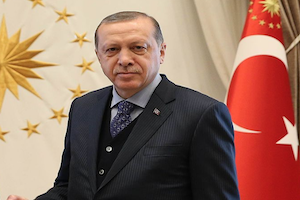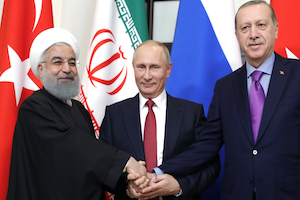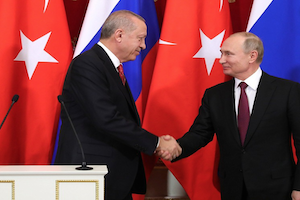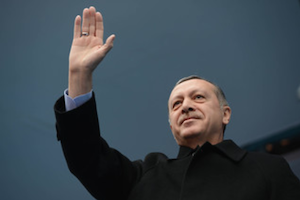Can Turkey Cope with COVID-19?
By Michaël Tanchum
April 13, 2020
On April 3, 2020, as Turkey passed 20,000 registered cases of Coronavirus Disease (COVID-19), President Recep Tayyip Erdoğan appeared on television to announce the implementation of a partial shutdown in Turkey, restricting movement in 31 of Turkey's 81 provinces. The new stricter measures came as the increasingly rapid spread of the virus propelled Turkey to the world's 9th highest number of COVID-19 cases and the world's 12th highest number of COVID-19 deaths. With its economy already overstretched by concurrent military interventions in Syria and Libya, Turkey is likely to find coping with the additional challenge of COVID-19 to be untenable.

Erdogan Talks Tough on Nuclear Weapons as Turkey Goes Ballistic
By Micha’el Tanchum
November 15, 2019
In early September 2019, Turkish President Recep Tayyip Erdoğan surprised many in the international community with his declaration that it was unacceptable for nuclear armed powers to prohibit Turkey from acquiring nuclear weapons. While many analysts dismissed Erdoğan’s declaration as more rhetorical posturing designed to advance Turkey’s status in the regional security architecture, the president’s remarks reveal Turkey’s perception of its own deepening strategic vulnerability vis-a-vis its regional rivals. Lacking the strategic weapons system to deter Iran, Saudi Arabia, or Israel, Erdoğan’s tough talk signals a shift in its nuclear policy that will likely be revealed in the advancement of its ballistic missile program.

After Ten Days that Shook Syria: Turkey's Dependence on Russia Reaffirmed
By Cengiz Çandar
November 5, 2019
Turkey’s intrusion into northeastern Syria will have far-reaching consequences for Turkey, the balance of power in Syria and in the Middle East. The Rojava invasion also leaves a durable imprint on international relations at a global scale. It has left the United States in a weaker position, while Russia has strengthened its grip on Syria. Turkey’s dependence on Russia has been reaffirmed. The Russo-Turkish partnership in Syria may not prove long-lived since Moscow and Ankara have different, indeed fundamentally irreconcilable political priorities. It is unlikely that Turkey, dependent on the acquiescence of Russia and with an ailing economy, will be able to establish a permanent military presence on Syrian territory.

Turkey's Russia Affair
By Suat Kınıklıoğlu
September 23, 2019
Turkey’s deepening partnership with Russia needs to be situated within a larger context. Turkey is moving closer toward Russia at a time when the West is beset by considerable turmoil. Seen from Ankara, both Europe and the U.S. increasingly look weaker, divided and ideologically adrift. Above all, though, Ankara’s pivot toward Moscow is driven by the domestic political needs of the Turkish leadership. The primary benefit of deepening the relationship with Russia lies in the legitimization of the current authoritarian rule. Yet ultimately the endeavor to reorient Turkey toward Russia and Eurasia faces the challenge that Turkey’s democratic tradition poses.

The Deeper Dynamics of the Istanbul Rerun
By Halil Karaveli
May 16, 2019
In Turkey, appearances tend to be deceiving. It is a mistake to take the cancellation of the Istanbul election result as proof that President Recep Tayyip Erdoğan refuses to accept defeat at the polls. The Kurdish vote decided the outcome in Istanbul, exposing the vulnerability of a system that was supposed to neutralize the influence of the Kurdish political movement. The Istanbul rerun speaks of the power of Devlet Bahçeli, the nationalist leader, and of the state cadres who see the victory of an opposition in tacit alliance with the Kurdish movement as an existential threat to the state. Erdoğan did not dare to challenge them.



